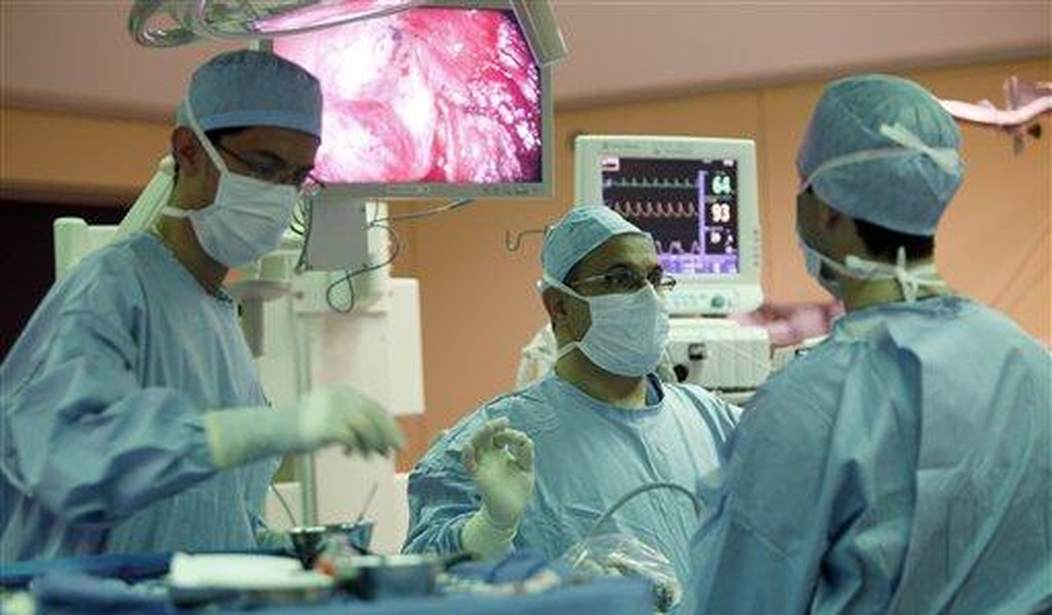Climate change extremists in the U.S. are banning the sale of new gas-powered cars in some states, while in other areas, they’re prohibiting gas-powered appliances in new builds. Colorado residents in sweltering heat are getting control over their thermostats taken away. A French dairy company is exploring strapping special methane-trapping masks on cows, while in the UK, they can no longer burn wood and coal in open fires. Just when you think advocates of the global movement couldn’t get any crazier, they come up with a new idea.
Such is the case with what researchers are reportedly calling on doctors to do to reduce hospitals' carbon footprint.
A new study suggests how surgeons could alter their practices to reduce emissions.
Anesthesiologists can play a role in reducing the greenhouse gas emissions that contribute to global warming by decreasing the amount of anesthetic gas provided during procedures without compromising patient care, suggests new research being presented at the American Society of Anesthesiologists’ ADVANCE 2023, the Anesthesiology Business Event.
Inhaled anesthetics used during general anesthesia are estimated to be responsible for 0.01% to 0.10% of the total worldwide carbon dioxide equivalent emission. For example, an hour of surgery using the inhaled anesthetic desflurane is equivalent to driving up to 470 miles, according to one study.1 Carbon dioxide is the primary greenhouse gas that traps heat in the Earth’s atmosphere, contributing to global warming.
“Global warming is affecting our daily life more and more, and the reduction of greenhouse gas emissions has become crucial,” said Mohamed Fayed, M.D., M.Sc., lead author of the study and senior anesthesia resident at Henry Ford Health in Detroit. “No matter how small each effect is, it will add up. As anesthesiologists, we can contribute significantly to this cause by making little changes in our daily practice — such as lowering the flow of anesthetic gas — without affecting patient care.”
While most general anesthesia procedures require high fresh gas flow (FGF) at the beginning and end of the procedure to achieve the desired effect quickly, it is safe and effective to lower the flow during the rest of the procedure, Dr. Fayed said. As part of the initiative to reduce FGF overall, the researchers educated anesthesiologists at their institution about the benefits of dialing down the anesthetic gas flow during the procedure, including through departmental presentations, newsletter articles, posters placed in work areas and emails. They also removed desflurane from their operating rooms because it produces the most significant carbon dioxide emissions from among the existing inhaled anesthetics. [...]
“For a long time, there was a notion that the greenhouse effect caused in health care settings was an inevitable and unavoidable cost of providing patient care,” said Dr. Fayed. “But we have learned that reducing anesthetic gas flow is one of the many ways health care can lessen its contribution to the global warming crisis, along with reducing waste, turning off lights and equipment when not in use and challenging practice habits, as long as they don’t compromise patient care.” (ReachMD)
When put on blast, however, Henry Ford Health issued a statement to Fox News Digital disputing the claims and noting that the American Society of Anesthesiologists pulled the study from its website.
"We want to make it abundantly clear that any inference that our health system is giving our patients a smaller amount of anesthesia than medically necessary is patently false," the statement said. "We would never compromise patient care, safety or comfort in any way or for any reason, and we are not decreasing the amount of anesthetic gas provided to patients during procedures."
Recommended
"The original article this misinformation is coming from, written by the American Society of Anesthesiologists (ASA), has been taken off the ASA website," it continued.
Update: The American Society of Anesthesiologists’ website appears to have pulled the climate anesthesia article. https://t.co/kMdePlR440
— Marc Morano (@ClimateDepot) February 6, 2023
But it is still available here: https://t.co/lbZcjI0Ujn https://t.co/4T0m89Sx4u pic.twitter.com/EJTvgvKf5l

























